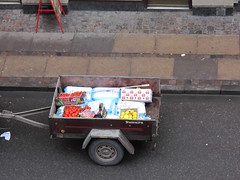Cross-border trade in an independent Scotland

When I was a kid, almost everybody in the village where I lived (100 miles from the German border) bought beer, wine, spirit, sugar, chocolate and a few other necessities in Flensburg. Over the years, the exact products have varied depending on the price differentials, but there’s always been something worth buying.
Obviously, the supermarkets know they’re losing trade to their German counterparts, but because the largest Danish cities are a bit too far from Germany to make the shopping trip worthwhile for people living there, Denmark is in general managing to keep prices higher than in Germany.
However, the distance from Glasgow (and the rest of the Central Belt) to Carlisle is about 100 miles, too — in other words, the vast majority of Scots live close enough to England that it’s worthwhile to drive down south to buy food and drink if the price differential is big enough.
What this means is that Scottish supermarkets will never be able sell anything at a price that is drastically higher than in England, even if it means their profit margins are reduced, simply because the alternative is not to sell very much at all (which is even worse for profits).
Morrison yesterday said this: “Our view is that if an independent Scotland increased or decreased regulation or taxes we’d have to take a second look at our pricing. Clearly that could work for or against Scottish customers depending on the direction of travel.” That sounds quite reasonable. I expect some products will be cheaper in Scotland, while others will be dearer.
What my experience from the Danish-German border tells me is that the overall price level cannot be much higher in Scotland than in England, because so many Scots live very close to the border. On the other hand, prices could theoretically be higher in the rUK than in Scotland, because only a small proportion of the population live close enough to the Scottish border to take advantage of cross-border trade.
To conclude, there’s reason to be optimistic. In an independent Scotland, politicians and supermarkets will have a joint interest in keeping prices down so that money flows in rather than out as a result of cross-border trade.
Yes. Prices are not necessarily closely related to cost.
Som en lille kommentar fra det nordjyske, så har cross-border trade mellem Danmark og Skotland altid fundet sted. Nuvel, på et meget lavt niveau i forhold til Danmark-Tyskland øl-shopping. I mit eksempel er det danske fiskere der på åben hav bytter grise for whisky-flasker med deres skotske kollegaer…
Sweet! 🙂
Rob Scovell liked this on Facebook.
Karsten Handrup liked this on Facebook.
Sorry, I should have commented on this one in english. I guess Thomas Widmann don’t mind to translate…
Last night’s blog post: Cross-border trade in an independent Scotland http://t.co/8lB3xPQOem #indyref
Cross-border trade in an independent Scotland http://t.co/Aef6GYZi39
RT @arcofprosperity: Last night’s blog post: Cross-border trade in an independent Scotland http://t.co/8lB3xPQOem #indyref